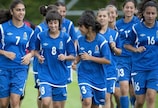Ireland's national women's league inaugurated
Thursday, October 20, 2011
Article summary
UEFA's funding for women's football continues to make a difference, with the latest example being Thursday's launch of a women's national league in the Republic of Ireland.
Article top media content

Article body
The Republic of Ireland has become the latest European country to launch a national women's league with UEFA's financial support.
The Bus Éireann Women's National League will commence in November, featuring six clubs who accepted the invitation to join the competition: Peamount United, Castlebar Celtic FC, Cork Women's FC, Raheny United FC, Shamrock Rovers FC and Wexford Youths Women's AFC.
Steffi Jones, the newly appointed ambassador for the UEFA women's football development programme (WFDP), said at the league's launch in Dublin: "Starting a national league is an essential step for women's football development in the Republic of Ireland. Playing in club competitions is the gateway to national team football and ensures a stable future for women's football, as well as an incentive for girls around the country."
The winner of the new competition will represent Ireland in the 2012/13 UEFA Women's Champions League, culminating in London. This season's European final will be played on Thursday 17 May 2012 in Munich, with the round of 16 starting on 2 November; Peamount recorded Ireland's best run this season by reaching the last 32 before bowing out to Paris Saint-Germain FC.
Ireland national women's coach Sue Ronan echoed the importance of regular league football for the progress of the female game: "A national league has been the biggest missing link on our player pathway and filling that gap means our players will now experience playing in a top-level competition at home, rather than having to go abroad to experience this.
"A tremendous amount of development work has taken place around the country at grassroots level over the past five years, which has resulted in a huge growth in our number of registered players – doubling from 10,500 to approximately 22,000 during that time. We can now look forward to many of these players progressing to the league, where they will have the opportunity to play against the best and realise their potential."
The FAI was one of four UEFA member national associations to receive UEFA funding during the first pilot phase of the WFDP during the 2010/11 campaign, the others being Italy, Portugal and Slovakia. UEFA's director of national associations and deputy general secretary Theodore Theodoridis said of this latest step: "UEFA is proud to see women's football continue to grow across its member associations. The launch of this league in the Republic of Ireland, in cooperation with the FAI, is another concrete example of UEFA's funding earmarked for women's football making a real difference."
Last December the UEFA Executive Committee approved the distribution of funds for the WFDP from its HatTrick assistance programme – that initial pilot phase in 2010/11 saw the distribution of €50,000 to each of the four FAs. From this month onwards, the second, 2011/12 pilot phase takes effect: with the WFDP having been allocated a bigger budget, funding to member associations will be increased from four to an unlimited number of FAs because of heightened interest.
Meanwhile, from July 2012 to 2016, every member association will be entitled to receive €100,000 a year to be used specifically for the development of girls and women's football as part of the WFDP and under the auspices of the HatTrick III programme. This represents a total investment of €22m and a clear demonstration of UEFA's commitment to this sector of the game.
The FAI also benefited from €316,000 in UEFA funding for women's football through the HatTrick II scheme in 2008. As a consequence, it was able to run a Soccer Sisters programme staged across 70 venues in the country and catering for more than 1,500 girls aged between 7 and 11.






